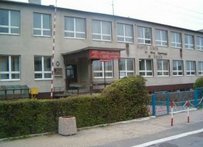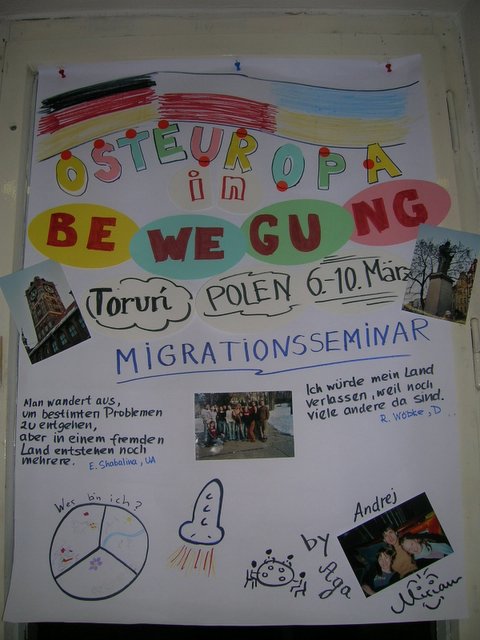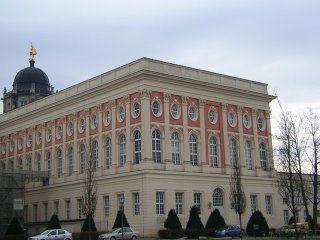German-Russian cooperation is supported on different ways.
One of the initiative is the Petersburger Dialog. It was initiated by the German Chancellor Gerhard Schröder and Russian president Wladimir Putin 2001 and it works till now. Since 2014 it is more and more criticized because of its political dependence.
The Petersburger Dialog consists of workgroups. Sometimes they invite to their meetings representatives of other nations.
Do you have enough of your branch? Look at neighbour branches and combine yours with others. Consider where you live and look for local connections. I work on history, politics, culture and even remembrance in East Central Europe. So pictures and texts here shed light on events, researches and places related to these fields in the regional context.
środa, sierpnia 17, 2011
German-Russian cooperation
Etykiety:
20th century,
21th century,
cooperate,
dialog,
German-Russian relationship,
identity,
media,
seminar,
work,
workgroup,
workshop
Lokalizacja:
Hamburg, Niemcy
środa, grudnia 02, 2009
Monuments in L'viv - 1867-1939 - a concept
Etykiety:
Austria-Hungary,
culture,
download,
interdisciplinary,
Internet,
L'viv,
memory,
monument,
politics,
remembrance,
research,
Russia
Lokalizacja:
Lwów, Obwód lwowski, Ukraina
wtorek, września 18, 2007
Stipend of Polish Ministry of Science and Higher Education
The Polish Ministry of Science and Higher Education supports the achievements of students at Polish universities. Not only the scientific results are here important, but also the social activities of students.
More about the conditions which students should fulfiled you can read here in Polish.
For the results of my study of German language and culture I received 2007 also a scholarship. The award ceremony took place in Toruń in Februar 2007.
More about the conditions which students should fulfiled you can read here in Polish.
For the results of my study of German language and culture I received 2007 also a scholarship. The award ceremony took place in Toruń in Februar 2007.
Etykiety:
city,
culture,
education,
German,
Germany,
language,
Ministry,
Polish-German relationship,
scholarship
Lokalizacja:
Toruń, Polska
piątek, grudnia 01, 2006
Internships at cultural and educational institutions
Making internship while study is very important. But you should look for the best institution for you.
I didn't think at the beginning about the culture department of Polish Embassy in Berlin, but thanks to help at the Polish Embassy I made this decision and it was the best one for me at this time.
I think practice is very important. Other internships I took part on were in July and August 2006 at German-Polish Youth Exhange and in September 2006 at the Highschool in Susz between Olsztyn and Gdańsk.
I didn't think at the beginning about the culture department of Polish Embassy in Berlin, but thanks to help at the Polish Embassy I made this decision and it was the best one for me at this time.
So in November 2006 I deepened my knowledge about current Polish-German relationship from the perspective of diplomats and the Polish Foreign Ministry.
I think practice is very important. Other internships I took part on were in July and August 2006 at German-Polish Youth Exhange and in September 2006 at the Highschool in Susz between Olsztyn and Gdańsk.
Etykiety:
culture,
diplomacy,
embassy,
German,
Germany,
intern,
Polish-German relationship,
relationship
Lokalizacja:
Berlin, Niemcy
czwartek, października 19, 2006
Vienna - city as museum
In October 2006 I took part on a seminar Vienna - city as museum. Fin de Siecle of Vienna.
Etykiety:
19th century,
20th century,
Austria,
Austria-Hungary,
Austrian,
Austrian-German relationship,
capital,
Central Europe,
city,
memory,
memory places,
monument,
museum,
nation,
remembrance,
seminar,
Vienna,
Wien
Lokalizacja:
Wiedeń, Austria
Escape, expulsion after the World War II and its commemoration
In September 2006 I took part on German-Polish seminar about escape, expulsion after the World War II and their commemoration. We were listening to memories of Sybiracy. We had a discussion with a member of German Association of German Displaced Persons (Bund der deutschen Vertriebenen). We've visited Cedynia to watch the monument of a battle by Cedynia and to discuss about myth of Piast dynasty.
Etykiety:
discussion,
experience,
memory,
memory places,
Polish-German relationship,
politics,
remembrance,
World War II
Lokalizacja:
Cedynia, Polska
sobota, lipca 29, 2006
Popularisation of democratic values by the Theodor-Heuss-Kolleg
The Theodor-Heuss-Kolleg was a funding programme of Robert Bosch Foundation. This collegue supported popularisation of democratic values among young people from East Central Europe.
I was a member of the Theodor-Heuss-Kolleg from May 2005 till July 2006. The photos present the finish of the collegue in July 2006 in Berlin.
I was a member of the Theodor-Heuss-Kolleg from May 2005 till July 2006. The photos present the finish of the collegue in July 2006 in Berlin.
Etykiety:
civic,
civil society,
collegue,
democracy,
East,
East Central Europe,
Europe,
seminar,
student,
study,
Theodor Heuss,
university
Lokalizacja:
Berlin, Niemcy
Training how to conduct a seminar
I recommend veryone to take part on trainings of every kind. Because I learnt to conduct an international seminar I took part on a training "How to conduct a seminar", which was organised by Theodor-Heuss-Kolleg of the Robert Bosch Foundation.
Etykiety:
civic,
civil society,
collegue,
culture,
democracy,
excursion,
seminar,
Theodor Heuss,
training
Lokalizacja:
Ryga, Łotwa
Eastern Europe on move
Project work is something very important for the personal development of young people. Students of Eastern and Central Europe could learn the project work in practice thanks to the Theodor-Heuss-Kolleg of the Robert Bosch Foundation.
Me as a member of the Kolleg together with two other members conducted an German-Ukrainian-Polish seminar about Eastern Europe on the move in Toruń in March 2006.
Me as a member of the Kolleg together with two other members conducted an German-Ukrainian-Polish seminar about Eastern Europe on the move in Toruń in March 2006.
History of Śląsk / Silesia
History of the borderland on example of Śląsk / Silesia is very important for Poles, Czechs and Germans.
Prof. Angelow (University Potsdam) conducted a seminar related to the history of Śląsk / Silesia from the 18th till 20th century.
Prof. Angelow (University Potsdam) conducted a seminar related to the history of Śląsk / Silesia from the 18th till 20th century.
Seminar group in Krasków by Świdnica
Etykiety:
18th century,
19th century,
20th century,
history,
Polish-German relationship,
seminar,
Silesia,
student,
trip,
university
Lokalizacja:
śląskie, Polska
czwartek, lipca 27, 2006
Difficult neighbourhood in Alsace and Lothringen
Relationships between France and Germany are called often as "difficult". Especially Alsace and Lothringen are the regions which caused conflicts.
So Prof. Jürgen Angelow and Prof. Bernhard Kroener (University in Potsdam) organised a seminar on the "difficult neighbourhood in Alsace and Lothringen in the 19th and 20th century". It took place at different places in Alsace and Lothringen in 2005.
I gave there a lecture about cardinal Richelieu's politics regarding other European countries.
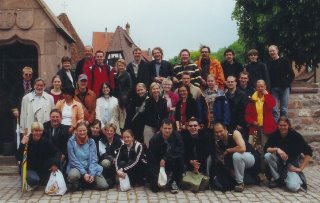

So Prof. Jürgen Angelow and Prof. Bernhard Kroener (University in Potsdam) organised a seminar on the "difficult neighbourhood in Alsace and Lothringen in the 19th and 20th century". It took place at different places in Alsace and Lothringen in 2005.
I gave there a lecture about cardinal Richelieu's politics regarding other European countries.


Etykiety:
Alsace,
Europe,
France,
French,
German,
Germany,
Lothringen,
neighbourhood,
reflection,
relationship,
seminar,
student,
university
Lokalizacja:
Alzacja, Francja
środa, lipca 26, 2006
Bologna process in Germany, Hungary and Poland
Students from almost all European countries should be interested in analyses of studies in Europe after the Bologna process.
The Polish Ministry of Science and Higher Education publishes a number of changes which are important for universities after the Bologna process.
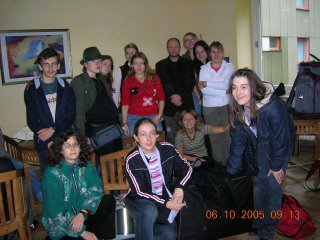 How it looks like in Germany, Hungary and Poland? Thanks to the cooperation between the Nicolaus Copernicus University, University in Göttingen and Szeged University in Hungary students of those universities could exhange their experiencies after the introduction of Bologna process at universities within a seminar.
How it looks like in Germany, Hungary and Poland? Thanks to the cooperation between the Nicolaus Copernicus University, University in Göttingen and Szeged University in Hungary students of those universities could exhange their experiencies after the introduction of Bologna process at universities within a seminar.
The Polish Ministry of Science and Higher Education publishes a number of changes which are important for universities after the Bologna process.
 How it looks like in Germany, Hungary and Poland? Thanks to the cooperation between the Nicolaus Copernicus University, University in Göttingen and Szeged University in Hungary students of those universities could exhange their experiencies after the introduction of Bologna process at universities within a seminar.
How it looks like in Germany, Hungary and Poland? Thanks to the cooperation between the Nicolaus Copernicus University, University in Göttingen and Szeged University in Hungary students of those universities could exhange their experiencies after the introduction of Bologna process at universities within a seminar.
Etykiety:
East Central Europe,
Europe,
seminar,
student,
study,
university
Lokalizacja:
Getynga, Niemcy
czwartek, czerwca 08, 2006
The Balkans in the 19. and the 20. century
I took part on a seminar about the history of the relationships on the Balkan in the 19th and 20th century in Varna 2006. On the seminar took part students of history at the Potsdam university and Bulgarian history students.
If you are interested in history of the World War I on the Balkan, I recommend you this book: Der Erste Weltkrieg auf dem Balkan: Perspektiven der Forschung (2011)
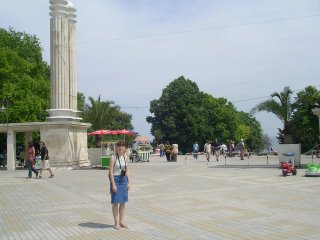
It's me on the main square in Varna.
If you are interested in history of the World War I on the Balkan, I recommend you this book: Der Erste Weltkrieg auf dem Balkan: Perspektiven der Forschung (2011)

It's me on the main square in Varna.
Etykiety:
Balkan,
Bulgaria,
democracy,
history,
nation,
nationalismus,
politics,
relationship,
Romania,
seminar,
student,
study,
the Balkans,
Turkey
Lokalizacja:
Warna, Bułgaria
piątek, maja 05, 2006
Scientific background and mentors
My scientific background is based on study of German culture and language at Nicolaus Copernicus University in Toruń 2002-2007 and history study at University of Potsdam 2007-2013.
I recommend you to go there because of many possibilities to develop your skills and interests. I took part on many excursions to different historical regions of East Central Europe and learnt to make researches on the history and culture of the region.
It all was possible only thanks to help of my mentors, Prof. Jürgen Angelow (University Potsdam), Prof. Maria Gierlak (Nikolaus-Kopernikus-University), Prof. Helmut Peitsch (University Potsdam), Prof. Włodzimierz Zientara (Nikolaus-Kopernikus-University) and Dr. Iwona Kotelnicka (Nikolaus-Kopernikus-University).
I recommend you to go there because of many possibilities to develop your skills and interests. I took part on many excursions to different historical regions of East Central Europe and learnt to make researches on the history and culture of the region.
It all was possible only thanks to help of my mentors, Prof. Jürgen Angelow (University Potsdam), Prof. Maria Gierlak (Nikolaus-Kopernikus-University), Prof. Helmut Peitsch (University Potsdam), Prof. Włodzimierz Zientara (Nikolaus-Kopernikus-University) and Dr. Iwona Kotelnicka (Nikolaus-Kopernikus-University).
Lokalizacja:
Poczdam, Niemcy
Subskrybuj:
Posty (Atom)




